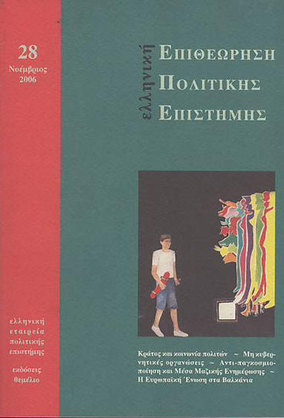Συλλογικές διεκδικήσεις και διοικητικές μεταρρυθμίσεις : όψεις της ελληνικής διοικητικής κουλτούρας
Part of : Ελληνική Επιθεώρηση Πολιτικής Επιστήμης ; No.3, 1994, pages 135-152
Issue:
Pages:
135-152
Parallel Title:
Collective demands and administrative reform : aspects of greek administrative culture
Author:
Abstract:
The attitude of the A.D.E.D.Y., the highest collective representative of the Civil Service employees, vis-à-vis the policies and projects of administrative reform, initiated during the post-dictatorial period in Greece, can be distinguished into three phases and forms: a phase of conditional support (1975- 1980), a phase of full support (1980-1989) and a phase of complete rejection (1990-1993).The policies and projects of administrative reform initiated during this period contained objectives which corresponded to, and produced this attitude in A.D.E.D.Y. They can be labeled as follows:a. Policies of hesitant modernisation, whose aim was the reestablishment, with minor adjustments, of the predictatorial regime in the Civil Service,b. Policies of administrative démocratisation, intended to bring about the levelling and equalisation of incomes, prospects for promotion, and power differentials among civil servants,c. Policies of organisational modernisation, designed to increase the internal differentiation of the administrative system and to advance the use of meritocratic criteria in the recruitment, promotion and remuneration within the Civil Service.The paper expounds the view that the attitude of the A.D.E.D.Y. vis-à-vis the particular policies and projects for administrative reform cannot be thoroughly explained, unless it is related to, and placed within, the context of a set of broader cultural logics and orientations which seem to mark and cut across modern Greek society. These cultural logics can, in a schematic and analytical way, be divided into (a) a more traditional, introverted, autochthonous and egalitarian attitude and orientation, and (b) a more modernised, rationalist, outward-looking, and radicalised attitude and orientation.It is no surprise that, between these two distinct cultural sets and logics, there tend to emerge various forms of conflicting and contradictory interactions. Neither of these, however, has managed definitively to prevail over and permanently to exclude its rival. In a curious and paradoxical way, the one cultural logic seems to presuppose and help reproduce the other.The paper concludes that, in such a context of «cultural columnisation», these particular cultural logics or sets possibly form distinct systems of values, whose identity is maintained and reproduced through, and by means of, their mutual self-referential engagement. In turn, this implies that, at the empirical level, administrative policies are likely to be shaped and, in various degrees of precision, conditioned by these distinct cultural logics and orientations.
Subject:
Subject (LC):
Keywords:
Ελλάς, δημόσια διοίκηση




